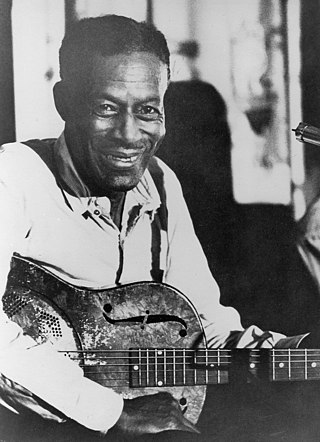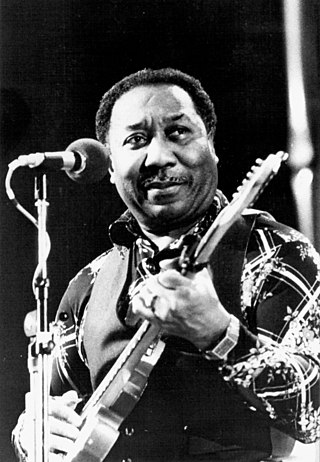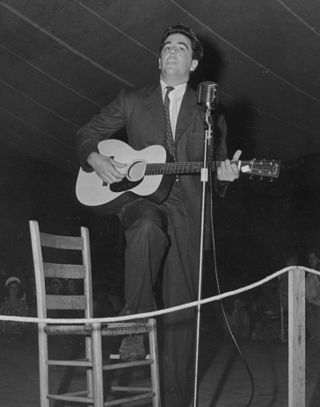
Robert Leroy Johnson was an American blues musician and songwriter. His singing, guitar playing and songwriting on his landmark 1936 and 1937 recordings has influenced later generations of musicians. Although his recording career spanned only seven months, he is recognized as a master of the blues, particularly the Delta blues style, and as one of the most influential musicians of the 20th century. The Rock and Roll Hall of Fame describes him as perhaps "the first ever rock star".

Edward James "Son" House Jr. was an American Delta blues singer and guitarist, noted for his highly emotional style of singing and slide guitar playing.

McKinley Morganfield, known professionally as Muddy Waters was an American blues singer, songwriter and musician who was an important figure in the post-World War II blues scene, and is often cited as the "father of modern Chicago blues". His style of playing has been described as "raining down Delta beatitude".

Muddy Waters (1913–1983) was an American blues artist who is considered a pioneer of the electric Chicago blues and a major influence on the development of blues and rock music. He popularized several early Delta blues songs, such as "Rollin' and Tumblin'", "Walkin' Blues", and "Baby, Please Don't Go", and recorded songs that went on to become blues standards, including "Hoochie Coochie Man", "Mannish Boy", and "Got My Mojo Working". During his recording career from 1941 to 1981, he recorded primarily for two record companies, Aristocrat/Chess and Blue Sky; they issued 62 singles and 13 studio albums.

Clarksdale is a city in and the county seat of Coahoma County, Mississippi, United States. It is located along the Sunflower River. Clarksdale is named after John Clark, a settler who founded the city in the mid-19th century when he established a timber mill and business. Clarksdale is in the Mississippi Delta region and is an agricultural and trading center. Many African-American musicians developed the blues here, and took this original American music with them to Chicago and other northern cities during the Great Migration.

Delta blues is one of the earliest-known styles of blues. It originated in the Mississippi Delta and is regarded as a regional variant of country blues. Guitar and harmonica are its dominant instruments; slide guitar is a hallmark of the style. Vocal styles in Delta blues range from introspective and soulful to passionate and fiery.
Country blues is one of the earliest forms of blues music. The mainly solo vocal with acoustic fingerstyle guitar accompaniment developed in the rural Southern United States in the early 20th century. It stands in contrast primarily to the urban blues style, especially in the pre-war era.

Alan Lomax was an American ethnomusicologist, best known for his numerous field recordings of folk music of the 20th century. He was a musician, folklorist, archivist, writer, scholar, political activist, oral historian, and film-maker. Lomax produced recordings, concerts, and radio shows in the US and in England, which played an important role in preserving folk music traditions in both countries, and helped start both the American and British folk revivals of the 1940s, 1950s, and early 1960s. He collected material first with his father, folklorist and collector John Lomax, and later alone and with others, Lomax recorded thousands of songs and interviews for the Archive of American Folk Song, of which he was the director, at the Library of Congress on aluminum and acetate discs.

The Delta Blues Museum in Clarksdale, Mississippi, United States, is a museum dedicated to collecting, preserving, and providing public access to and awareness of the musical genre known as the blues. Along with holdings of significant blues-related memorabilia, the museum also exhibits and collects art portraying the blues tradition, including works by sculptor Floyd Shaman and photographer Birney Imes.

R. L. Burnside was an American blues singer, songwriter and guitarist. He played music for much of his life but received little recognition before the early 1990s. In the latter half of that decade, Burnside recorded and toured with Jon Spencer, garnering crossover appeal and introducing his music to a new fan base in the punk and garage rock scenes.

At Newport 1960 is a live album by Muddy Waters recorded during his performance at the Newport Jazz Festival on July 3, 1960. With his longtime backup band, Muddy Waters plays a mix of his older popular tunes and some newer compositions. Chess Records released the album in the United States on November 15, 1960.

Folk Singer is the second studio album and fourth album overall by Muddy Waters, released in January 1964 by Chess Records. The album features Waters on acoustic guitar, backed by Willie Dixon on string bass, Clifton James on drums, and Buddy Guy on acoustic guitar. It is Waters's only all-acoustic album. Numerous reissues of Folk Singer include bonus tracks from two subsequent sessions, in April 1964 and October 1964.

Edward Riley Boyd was an American blues pianist, singer and songwriter, best known for his recordings in the early 1950s, including the number one R&B chart hit "Five Long Years".

Willie Lee "Big Eyes" Smith was an American electric blues vocalist, harmonica player, and drummer. He was best known for several stints with the Muddy Waters band beginning in the early 1960s.
"Walkin' Blues" or "Walking Blues" is a blues standard written and recorded by American Delta blues musician Son House in 1930. Although unissued at the time, it was part of House's repertoire and other musicians, including Robert Johnson and Muddy Waters, adapted the song and recorded their own versions.
Henry "Son" Sims was an American Delta blues fiddler and songwriter. He is best known as an accompanist for Charley Patton and the young Muddy Waters.
Johnny "Big Moose" Walker was an American Chicago blues and electric blues pianist and organist. He worked with many blues musicians, including Ike Turner, Sonny Boy Williamson II, Lowell Fulson, Choker Campbell, Elmore James, Earl Hooker, Muddy Waters, Otis Spann, Sunnyland Slim, Jimmy Dawkins and Son Seals.
Reverend Willie Morganfield, was an American gospel musician and minister. He started his music career, in 1959, with the release of a single, "What Is This?", which was made into a popular arrangement by the gospel music singer and pastor Walter Hawkins in 1980. His albums were primarily released by Jewel Records with a few by Paul Records. The only release that charted, Golden Hits, was released by Jewel in 1984, and this placed on the Billboard magazine Gospel Albums chart.

More Real Folk Blues is an album compiling singles recorded by blues musician Muddy Waters between 1948 and 1953 that was released by the Chess label in 1967.















